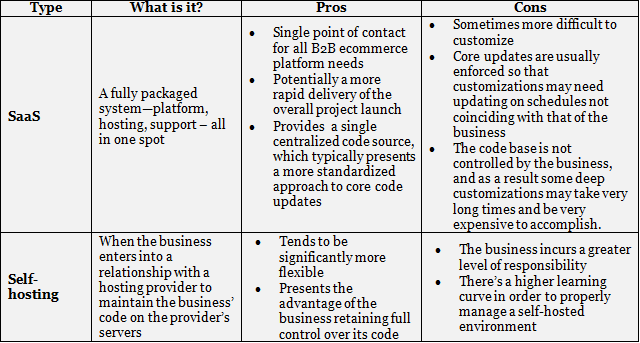
3 Things to Consider when Choosing a B2B eCommerce Platform
Previously, I wrote about the consumerization of B2B and the shift of resources from traditional or catalog sales channels to eCommerce. As B2B buyers shift to eCommerce for current and future business transactions, it’s important for sellers to choose the best eCommerce platform for their business. There are three factors that stand out as the most important considerations: development language and framework, style of code and site hosting, and required level of customization.
Development language and framework
In development, a framework provides organization to the written code, and this organization creates a greater flexibility in usage of the code. This often increases code efficiency and readability, making the final code better performing, decreasing time required to make code changes, and potentially decreasing the frequency of code refactoring.
Language compilation is the process of restructuring programming code from a human readable and writable format to one that a computer will understand. Interpreted languages typically host development code at the server and compile “on the fly”, or just before the webpage is displayed to a viewer. In contrast a compiled language “precompiles” the code, and presents only the compiled version to the server.
In nearly every instance interpreted languages exhibit much more rapid delivery cycles (how quickly any given piece of development may be completed and put in use on a website) than compiled languages. This however does come at a cost, as time is required to perform compilation, and compiling “on the fly” can impact the time to view for site page performance. Although much of this additional overhead may be compensated for by using various caching schemes, these too come with costs and overheads which need also be evaluated when making the decision.
It is important to evaluate business needs to quantify the importance of development cycle speed. If it is highly important that new functionality be introducible to the B2B site quickly, then a greater emphasis on use of an interpreted language may be appropriate.
Style of Code and Site Hosting
The two primary choices for hosting are Software as a Service (SaaS) and self-hosting. Within these are options that include on-demand hosting, single environment, cluster environment, redundancy and fail-over systems, replication systems, and a plethora of other features which may be of value to the eCommerce platform.
The following table compares the two types.
Required Level of Customization
Vitally important, especially with a B2B site, is the ability of an eCommerce platform to support customization. The level of such support will depend on the nature of the platform—the language and framework used, the method of code and site hosting provided, and finally the ability of the platform itself to be customized. With all of the above in mind the ease and speed with which customizations may be applied to a platform can be broadly expressed as:
- Language – interpreted languages will generally customize more quickly than compiled languages
- Hosting – self-hosted platforms are often more flexible in the ability to customize than SaaS
This however says nothing regarding the software platform itself, and it is necessary to closely inspect the individual platform to see if its presented features are useful to the B2B endeavor, and where there are gaps if the platform is adequately suitable for customizations to fill these gaps.
When considering an eCommerce platform for B2B development, it is important to understand what works best for your business in terms of development language and framework, style of code and site hosting, and required level of customization. Once you match your goals with what suits you best, you will be able to fully realize your eCommerce potential.
Charles Kain is a Technical Architect on the LYONSCG eCommerce Implementation team. He leads discovery and refinement processes for client requirements, develops scalable enterprise solutions to fit client needs, and acts as a primary technical lead for projects. Charles is a Magento Certified Developer and has several patents in the knife industry for products he has invented.

